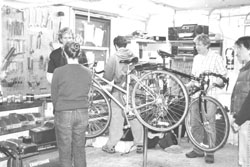

Revolving
Wheels; Evolving Philosophy
BY ALYSON DAME
Over the past few years, Oberlin’s student-run bike co-op has been fine-tuning
the organization and working to get all its gears running smoothly.
Its home in the basement of Keep Cottage has expanded.
 (photo by Lee Dolan) |
Grants and an energized staff have helped
to increase hours, expand community outreach, offer two ExCo’s and create
a summer program that is entering its third year.
Senior and bike co-op president David Bevacqua has worked to broaden
the mission of the co-op. “When I first got involved in Fall ’98, it
was more or less a student club. There weren’t many hours during the
week. I came in with a big flux of people that were interested in the
future of the bike co-op,” he said.
The bike co-op’s mission has changed over time. Professor of environmental
studies John Petersen was instrumental in starting the bike co-op when
he was a student. “The group that started the co-op was an odd mixture
of those of us like myself, who were political activists and folks who
were fairly apolitical or anarchistic, but loved bicycles. For those
of us who were political, the bike co-op was a neat means of combining
social activism with something wonderfully hands-on,” Petersen said,
adding, “The slogans we printed on our first T-shirt designs are a testament
to our thinking — ‘The revolutionary recyclery’, ‘Building technological
democracy.’”
Bevacqua has seen the philosophy become more politically involved during
his involvement. “It’s gone through some big waxing and waning of ideas
and personnel and through the years it has been more or less involved
with the College or the town,” Bevacqua said.
One of the first objectives of the new leadership was to expand community
outreach. “There was a lot of excitement, I remember. We decided the
way we could accomplish the most in the alternative transportation movement
was not to help College students keep their new bicycle shiny but to
get more involved with community members and kids, especially,” Bevacqua
said. Grants provide the extra funding for these plans. Sadu Johnson,
OC ’98, helped write two grants in 1999. “We were awarded a huge grant
from Stocker Foundation that year for $8,000 and the Bill Long Foundation
also gave us $500,” Bevacqua said, adding, “That was money for the organization
and our management and then also to pay summer employees.”
In the summer of 1999 the bike co-op was open for bike repair classes
for community kids and adults, but as Bevacqua said, “The most lasting
change was the renovation. We changed the back room from a filthy bike
graveyard into a teaching shop with room for six bikes and three complete
workstations.” Last summer, three employees continued the classes and
completed the renovation.
Today, the bike co-op is open, clean and organized. Spare parts are
kept together, tools are hung neatly, and rows of rental bicycles have
been restored to working condition so that the demand on campus can
be met.
Senior and treasurer Tori Johnson is proud of the bike co-op’s self-sustainability.
“Right now, we’re still dependant on grant money for summer programs.
Aside from that, we’re pretty self-sufficient. We don’t get money from
SFC,” she said. The bike co-op’s economic independence does not become
a burden for members. “The idea is that because it’s a cooperative people
aren’t paying huge mark-ups on different parts,” she said.
The semester membership fee of $6 allows members access to the tools
and mechanic know-how during open hours, as well as cheap used parts,
and new parts close to the wholesale prices. “Anything we don’t have
can be ordered from our catalogs,” Johnson said.
The bike co-op runs a rental program and an Earn-a-Bike program, but
does not currently sell bikes. Johnson noted that to sell bikes would
make the co-op a competitor with local businesses, which was outside
of what she saw as their objective. “It’s really tempting to want to
sell bikes, because we have more bikes than we really know what to do
with. But we’ve really made a concerted effort not to do retail,” Johnson
said.
Both Johnson and Bevacqua see the bike co-op’s work as part of a bigger
movement to rethink transportation. “The number of students who drive
their cars around Oberlin is enormous, and its stupid. And I think if
it wasn’t so easy to get a bicycle, even more students would drive,”
Bevacqua said.
![]()
Student Health Contractor Goes Bankrupt
Panel Discusses White Privilege
Revolving Wheels; Evolving Philosophy
DS3 Line To Make Resnet Faster
Elyria Store Does Wicked Awesome Airbrushing
Dining Proposal Review Postponed Until After Break